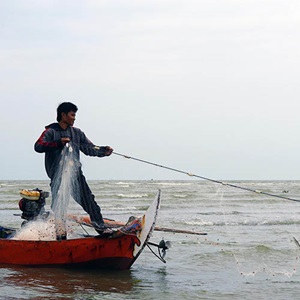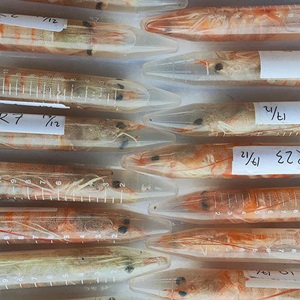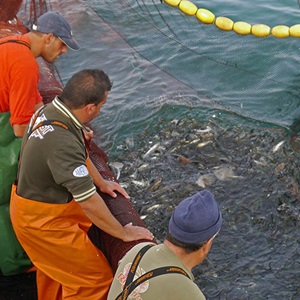A project to evaluate the most effective means of reducing harmful interactions with endangered, threatened and protected species.
• A literature review of international measures and gear technology for minimising ETP bycatch
• Identification of potential operational practices to minimise bycatch in consultation with fishers
• Assessing the efficacy of and potential application for bycatch reduction devices (BRDs)
Start date: April 2025
€10,200
Student Research Grant
Awardee
Iro Anastasopoulou, Masters student at the Agricultural University of Athens
Fishery
Aegean Sea albacore tuna longline fishery; Aegean Sea swordfish longline fishery
Greek large pelagic fisheries: Securing biodiversity and livelihoods
Greece has the most numerous fishing fleet in the European Union, and fishing is of huge economic and ecological importance to the nation’s small island communities.
The Aegean albacore tuna (Thunnus alalunga) and swordfish (Xiphias gladius) fisheries operate in the eastern Mediterranean Sea using drifting pelagic longlines. When not managed sustainably, longline fisheries are prone to high numbers of incidental catch of non-target species. Bycatch can include sea turtles, sharks, rays, seabirds, marine mammals and other endangered, threatened and protected (ETP) species.
The fisheries are members of the HellasFish project – part of the MSC Pathway to Sustainability program, which aims to support Greek fisheries with a framework to make their fishing practices more sustainable.
As part of the program fisheries are pre-assessed against the MSC Fisheries Standard. The pre-assessments highlight areas of fishing operations that require improvement. For the Greek longline fisheries, this includes minimising their impacts to ETP species encountered as bycatch.
Supporting the fisheries to meet their sustainability goals, Masters student Iro Anastasopoulou of the Agricultural University of Athens, has been selected to receive a Student Research Grant for her research project, from the MSC Ocean Stewardship Fund.

What the project will do
The project aims to improve methods for sustainable fishing practices and reduce the impacts of fishing gears on the ecosystem.
The project will commence with a full literature review of international measures and longline fisheries bycatch mitigation technologies. These will be evaluated to ascertain the most effective bycatch reduction devices for the Aegean fisheries.
The best technologies and gear modifications will be presented to the fisheries for consultation with stakeholder groups, as part of their Fisheries Improvement Action Plan. Anastasopoulou will then investigate the possibility of testing and applying the best techniques with fishers in real life conditions.
The goal is to implement these approaches into the fisheries’ operational practices and see them adopted by other similar fisheries in the region, including those targeting Atlantic bluefin tuna (Thunnus thynnus) in the Mediterranean Sea.
Through her research and funding, Anastasopoulou will work to secure livelihoods of traditional fisheries in the eastern Mediterranean Sea and significantly reduce impacts to the region's biodiversity.
“This funding will support my research and the development of sustainable fishing in Greece. My research will provide new insights on interactions between ETP species, such as sharks and rays, and the drifting longline fisheries. Protecting these species not only supports the sustainability of the fisheries but contributes to ocean conservation efforts under UN SDG14.”
Related projects

Indonesia Central Java prawn: Environmental DNA analysis

Indonesia Central Java prawn: Researching genetics

